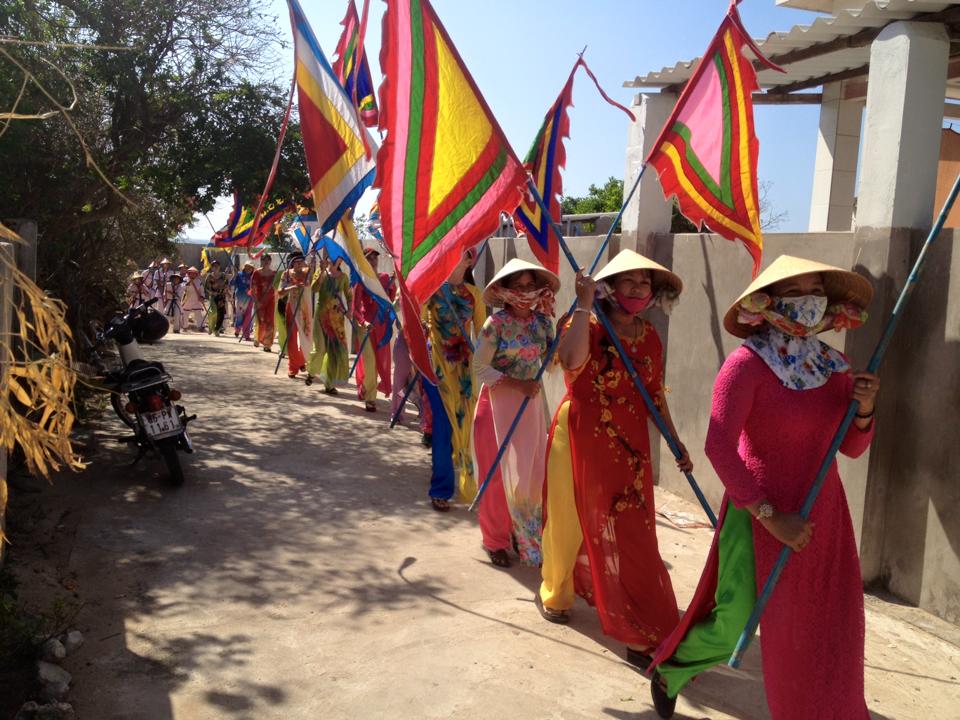The Mother Goddess worship belief has been built and preserved throughout the formation of Phu Quy Island, based on historical stories and legends about national heroes. Let’s explore the Mother Goddess worship belief in Phu Quy Island.
The Belief in Princess Ban Tranh
According to the legend, Princess Ban Tranh was a Cham princess exiled to this island because she refused to marry a prince from another kingdom against the king’s wishes. Her boat carried many attendants, servants, supplies, and farming tools. After many days drifting at sea, they finally landed on the island. With her determination and leadership, the princess decided to establish a new life on this wild, uninhabited island. Her group began reclaiming the land, farming, fishing, gradually stabilizing life and founding the first villages. When the princess passed away, people buried her and built a shrine at the present temple site. She was considered very spiritual and protective, so locals felt secure under her guardianship throughout all villages on the island.
Princess Ban Tranh is regarded as a sacred spirit and protector by the entire island community. Due to her great contributions, people in Phu Quy honor her as Bà Chúa Xứ (Lady of the Realm). The shrine dedicated to her is called the Princess Ban Tranh Temple or the Lady’s Temple. The Nguyen dynasty kings bestowed many royal decrees granting her the title of “Thượng đẳng thần” (Highest-ranking deity).
The custom of worshipping Princess Ban Tranh reflects the Mother Goddess faith of the Phu Quy people. The residents revere her as the patron saint of agriculture, credited with introducing humans and crops to the island, reclaiming barren land, founding villages, and teaching farming—transforming a deserted island into a prosperous community.
The Belief in Lady Ngoc Thien Ya Na (Dien Ngoc Phi Nuong Nuong)
Lady Ngoc Thien Ya Na, also known as Dien Ngoc Phi Nuong Nuong, is actually the Cham goddess Pô Inư Nagar, revered as the Mother of the Land. Legend says that in the Nui Chua mountains of Dai Dien (present-day Khanh Hoa), an old childless couple lived by growing melons. One night, the old man caught a young girl stealing melons and, pitying her as an orphan, took her home to raise. One day, after being scolded by her adoptive parents during a flood, she transformed into a patchouli wood floating out to sea all the way to Bac Hai (North Sea). People from the north tried to pull the fragrant wood ashore but failed until the northern prince personally retrieved it for worship.
The wood gave off a sweet fragrance, and from it, the girl appeared, whom the prince married. They had two children, a boy named Tri and a girl named Qui. Lady Thien Ya Na is the girl in the wood. Later, when she remembered her old home, she returned to Nui Chua only to find her adoptive parents deceased. Seeing the gentle local people, she taught them farming, rescue skills, established laws, and then ascended back to heaven. When the Vietnamese moved south, they adopted and adapted the Cham Mother Goddess worship into their own customs.
On Phu Quy Island, people have long revered Lady Ngoc, holding solemn annual rituals in her temples. The Nguyen emperors granted her the title “Thượng đẳng thần.”
The Belief in Lady Cuu Thien Huyen Nu
According to legend, Cuu Thien Huyen Nu, also called Mother Sinh in folk belief or Buddha Mother in Chinese mythology, means “The Mysterious Woman of the Ninth Heaven,” a title of the Buddha Mother. In ancient times after King Than Nong, tribes separated and fought for power. A powerful tribe led by the cruel Xuy Vuu sought to conquer others. Only the tribe led by Huu Hung Thi could resist.
Cuu Thien Huyen Nu appeared to teach Huu Hung Thi how to build war chariots and military strategies to defeat Xuy Vuu’s army. After victory, all tribes honored Huu Hung Thi as Emperor Huynh. Since he was born at Hien Vien mound, he was later called Vien Hien Huynh De. Cuu Thien Huyen Nu frequently appeared to assist rulers in war, invented sericulture (silkworm farming), taught astrology, and helped create hieroglyphics. She is considered the master of Emperor Huynh, a military deity, patron of many crafts, widely worshipped since the Tang dynasty in China and influencing folk culture across Asia, including Vietnam.
In Vietnam, Cuu Thien Huyen Nu is seen as the protector of life, exorciser of evil spirits, and ancestor of woodworking, singing, and dancing professions. On Phu Quy Island, she is considered the ancestor of crafts and artistic trades such as weaving, sewing, singing, and acting. She is also the female protector. However, in Phu Quy, she does not have her own temple but is worshipped alongside other deities in some shrines.










